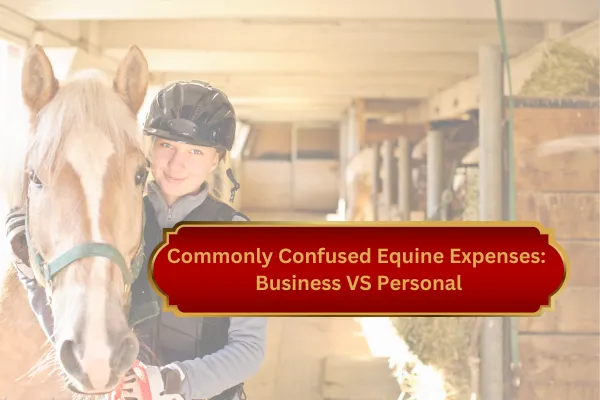The Legit Ledgers Blog

Commonly Confused Equine Expenses: Business VS Personal
According to the IRS, an expense is only deductible if it is ordinary, necessary, and reasonable in carrying on your trade or business. The reason it is critical for business owners to keep personal and business expenses separate is because business expenses can be used to reduce your business income on your tax return, personal expenses cannot. Not only is it important to keep expenses categorized correctly, it's also imperative that the records for business assets stay separate from personal assets.
It's easy for business owner's to get confused by what is considered business and what is considered personal - especially in the horse world. Here is a great list of the top most commonly muddled assets and expenses in some areas of the equine industry.
Business Expenses and Assets
Buildings used for your business: stables, arena, barn office, etc. Recorded as a fixed asset and depreciated.
Horses used for income producing activities in your business. Recorded as a fixed asset and depreciated or as inventory if they are meant for resale.
Vet bills for your guard dogs kept for security at your stables.
Equipment used in income producing activities: tractor, ATV, implements, etc. Recorded as fixed assets and depreciated.
Vet, farrier, insurance, etc. for horses used in income producing activities.
Tack, gear, and equipment for the horses used in income producing activities.
Stable expenses for items including: saddle and tack racks, fly management systems, hay feeders, bedding, feed, wash systems, security systems, etc.
Land expenses for the land used in income producing activities for the business including: landscaping costs, fencing, and gates.
Note: Best business practice is to have any and all business assets in the name of the business and not in your personal name. This is also a key element in keeping your personal assets protected in the case of litigation against your business.
Personal Expenses and Assets
Owner's horses that are not used in any income producing activities for the business.
Cost of tack, equipment, clothing, and any gear purchased for use with your own personal horses which are not used in any income producing business activities.
If your home is on the land where your business is located, your entire mortgage is not deductible as a business expense.
Utilities for your home, not used in business income production such as electric, water, heat. An exception to this is if you have a home office used for your business. In this case, a portion of your utilities and mortgage interest could be deductible.
Unless a vehicle is in the name of the business and used 100% for business purposes, it is not completely deductible as a business expense, and should not be in your business's bookkeeping as an asset.
While this list is a great place to start in sorting out your business and persona affairs, I always recommend sitting down with your own bookkeeper, accountant, or CPA to discuss the specific intricacies of your business in particular to determine what's right for you.
If your sick of trying to do your horse business's bookkeeping on your own and need some help, schedule a free consult with us to get started on the path to a simpler and stress-free financial system.



